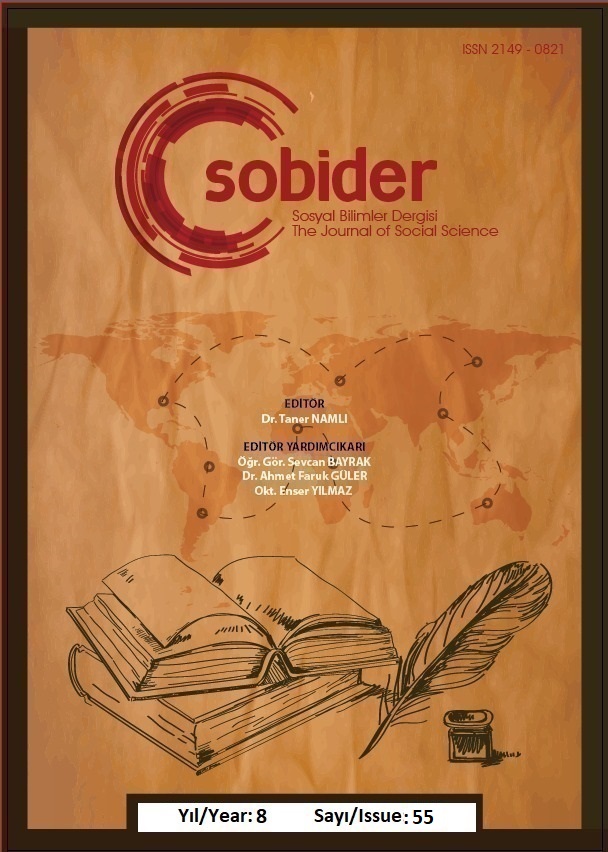Author :
Abstract
Bu makalede Orhan Pamuk’un Kara Kitap adlı romanı kültürel kimlik arayışı bağlamında okunarak incelenmiştir. Özellikle de modernleşme ve batılılaşma eğilimleri sonucu ortaya çıkan kültürel kimlik kaybı ve sorunu, Kara Kitap’ın ve incelememizin odak noktasıdır. Modernleşme, batılılaşma, en genel anlamda bir kültür değişimi olduğu için doğrudan kültürel kimlikle ilişkilidir. Uzun yıllardır doğu medeniyeti dairesinde şekillenen Osmanlı kültüründen sonra, Batı medeniyetinin felsefi, siyasi, sanatsal ve sosyal yaşamı model alınarak gerçekleştirilen modernleşme, batılılaşma süreci, en nihayetinde bir kültür değişimine zemin hazırlamıştır. Neredeyse asırlar sonucu oluşan ve içselleştirilen kültürün değişimi her zaman sancılı bir süreç olmuştur. Çünkü bireysel ve toplumsal düzeyde, tercihlerin, gündelik hayatın, sanatın ve ahlakın üstündeki güç kültürdür. Elbette ki kültürel kimlik de bu kültür çerçevesinde oluşur. Pamuk’un romanı da bu süreçteki değişimin bireysel ve toplumsal hafızadaki etkilerine, mekânın, alışkanlıkların, yaşam biçiminin değişimine ayna tutmuş, eleştirel bir yaklaşımla kurgusal düzleme aktarmıştır.
Keywords
Abstract
In this article, Orhan Pamuk's novel The Black Book has been read and analyzed in the context of the search for cultural identity. The loss and problem of cultural identity, especially as a result of modernization and westernization tendencies, is the focus of the Black Book and our analysis. Since modernization, westernization, is a cultural change in the most general sense, it is directly related to cultural identity. After the Ottoman culture, which has been shaped in the eastern civilization for many years, the process of modernization and westernization, which has been modeled on the philosophical, political, artistic and social life of the Western civilization, has finally laid the groundwork for a cultural change. The change of culture, which has been formed and internalized as a result of almost centuries, has always been a painful process. Because at the individual and social level, the power above preferences, daily life, art and morality is culture. Of course, cultural identity is formed within the framework of this culture. Pamuk's novel also mirrored the effects of the change in this process on individual and social memory, the change of space, habits and lifestyle, and transferred it to the fictional plane with a critical approach.
Keywords
- Atakay, K., (2013), Kara Kitap’ın Sırrı, Kara Kitap Üzerine Yazılar, ( 3. baskı )Der: Nüket Esen, İletişim Yay. İstanbul.
- Ayvazoğlu, B. (1997), Geleneğin Direnişi, ( 1. baskı ),Ötüken Yay. Ankara.
- Belge, T. (2013), Rüyadan Kâbusa Fantastik Şehir İstanbul, Kara Kitap Üzerine Yazılar, ( 3. Baskı )Der: Nüket Esen, İletişim Yay. İstanbul.
- Campell, J. (2000), Kahramanın Sonsuz Yolculuğu, ( 3. baskı ), Kabalcı Yay. İstanbul
- Deren, S. (2002), Kültürel Batılılaşma, Modernleşme ve Batıcılık, Edit: Uygur Karabaşoğlu, ( 2. baskı ), İletişim Yay. İstanbul.
- Eagleton, T. (2014), Tanrının Ölümü ve Kültür, ( 1. baskı ),Yordam Kitap Yay. İstanbul.
- Ever, M. (2013), Adlar ve Kitaplar, Kara Kitap Üzerine Yazılar, Der: Nüket Esen, ( 3. baskı ),
- Goytisolo, J. (1996), Orhan Pamuk’un Kara Kitabı, Defter Dergisi, Yaz, 1996
- Güvenç, B. (2009), Kültür, Kimlik ve Kimlikler, Kimlikler Lütfen, Der: Gönül Pultar, ( 1. baskı ), ODTÜ Yay. Ankara.
- Keyman, E. F. (2012), Türkiye’de Laiklik Sorununu Düşünmek: Modernite, Sekülerleşme, Demokratikleşme, Kimlikler, ( 3. Baskı ), Doğu Batı Dergisi, Sayı:23. Ankara.
- Kolcu, A. İ. (2013), Türk Romanı El Kitabı, ( 1. baskı ), Salkım Söğüt Yay. İstanbul.
- Levis, B. (2004), Modern Türkiye’nin Doğuşu, ( 3. baskı ), Türk Tarih Kurumu Yay. Ankara
- Moran, B. (2015), Türk Romanına Eleştirel Bir Bakış III, ( 3. baskı ), İletişim Yay. İstanbul.
- Pamuk, O. (2010), Kara Kitap, ( 8. baskı ), İletişim Yay. İstanbul.
- Salmış, FERMAN (2014), Kimlik Sancısı, ( 1. baskı ), Bilsam Yay. Malatya.
- Şen, T. (2007), Kara Kitap’ın Galib’i, Orhan Pamuk Edebiyatı, Edit, Fahri Aral, ( 1. baskı ), Agora Kitaplığı. İstanbul.





